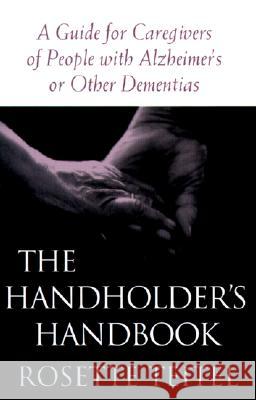The Handholder's Handbook: A Guide for Caregivers of People with Alzheimer's or Other Dementias » książka
The Handholder's Handbook: A Guide for Caregivers of People with Alzheimer's or Other Dementias
ISBN-13: 9780813529400 / Angielski / Miękka / 2001 / 216 str.
" Teitel's] self-help book may be essential for anyone who has to deal with a disease that robs their loved ones of their personality, that short circuits their brain waves, making it impossible to get a spoon from the table into their mouths. 'I've been there and can assure you that there really is a light at the end of the tunnel. You will come out of the darkness, ' says Teitel, who brought her skills honed as a teacher to this book."-Newsday " Teitel's] book offers the basics about various forms of dementia, including early symptoms and diagnosis, behavioral and emotional changes, and treatment options. . . . Teitel emphasizes the need for caregivers to care for themselves, and she includes a chapter featuring stories from other care providers."-Library Journal "An extremely practical guide, the book begins with diagnosis. . . . Day-to-day problems are addressed with creative common sense. . . . Rosette Teitel's book is both useful and comforting, and it belongs in any collection for caregivers."-AMWA Journal "Rosette Teitel has written a courageous and informative caregiver's guide from the perspective of someone who has been there and done that. It's like a portable support group. For every issue that threatens to overwhelm you, there is a calm, reassuring, and pragmatic response. Moreover, she anticipates the problems you are likely to encounter, affording you the opportunity to cope with them before they escalate into crises."-from the foreword by Marc L. Gordon, chief of neurology, Hillside Hospital, Long Island Jewish Medical Center "It is my sincere hope this handbook will give you comfort and perspective. I've been there, and can assure you that there really is a light at the end of the tunnel. You will come out of this darkness. I send you my caring and support."-from The Handholder's Handbook In a national survey, 19 million Americans said they have a family member with Alzheimer's, and 37 million said they knew someone who had it. But when Rosette Teitel found herself in the role of caregiver to her ailing husband, she could find no books that answered her practical needs: How do you give a 170-pound man a shower? How do you pick him up when he falls? What support networks are available? When is it time to consider a nursing home and how do you find one? While many books about Alzheimer's disease focus on the illness and the patient, Teitel draws on her own experience to tackle subjects rarely dealt with in other self-help books. She covers topics such as managing the expenses of long-term care through Medicaid, estate planning, and preparing for the patient's death and the loss of someone whose daily survival has been at the center of one's existence. The chapters contain information on diagnosis, treatment, and the progression of the disease; the physical and emotional changes involved with the day-to-day caregiving; support networks; nursing homes; finances; death of the patient; mourning, and life after the patient's death; and interviews with caring children of parents with Alzheimer's disease. In addition, Teitel provides a helpful list of frequently asked questions, scheduling and memory aids, and websites where readers can find resources. Rosette Teitel is a retired high school teacher who nursed her husband through vascular dementia until his death.











